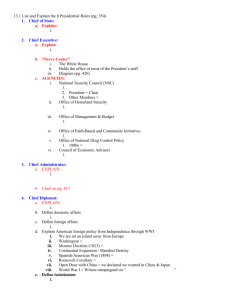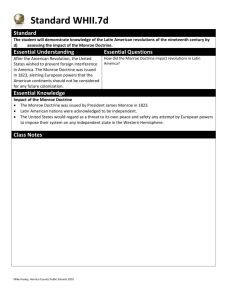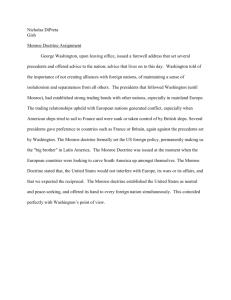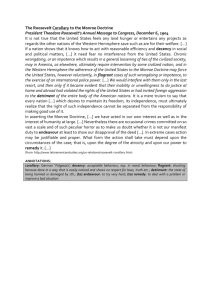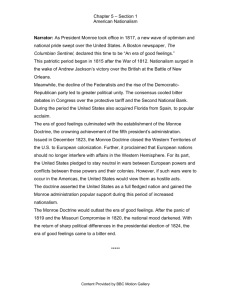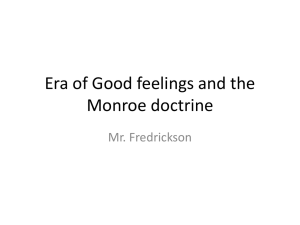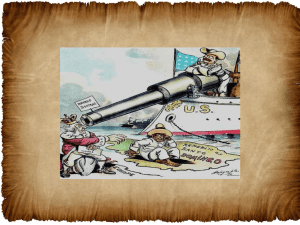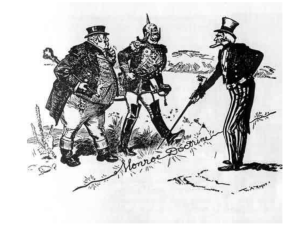The Monroe Doctrine was delivered to Congress by President
advertisement
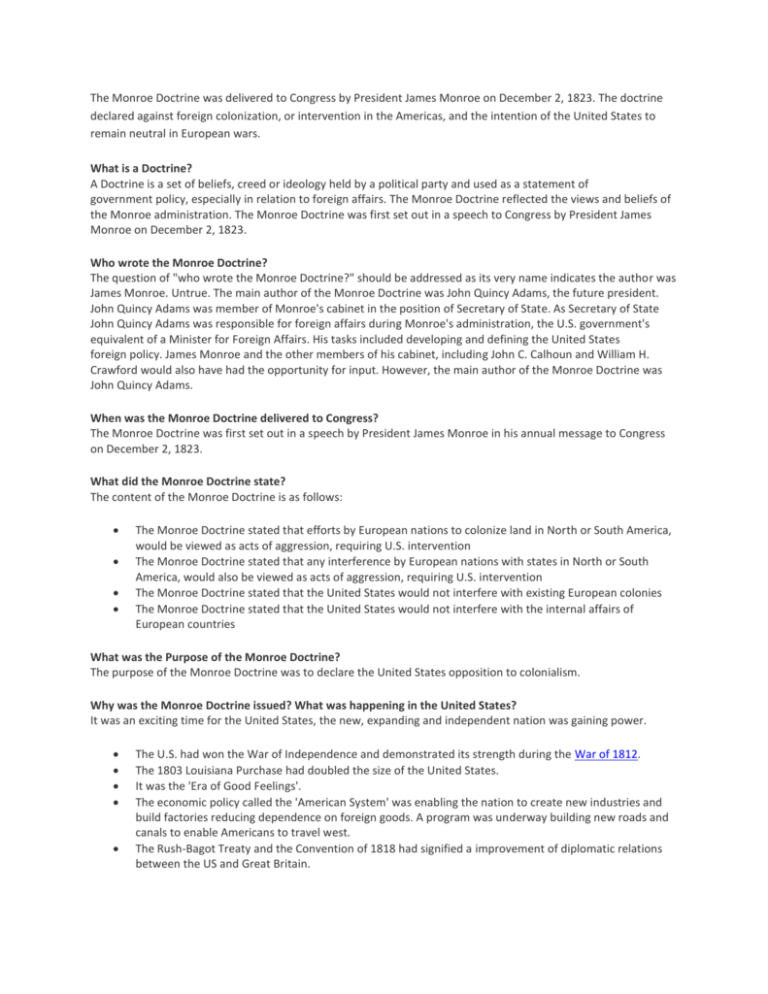
The Monroe Doctrine was delivered to Congress by President James Monroe on December 2, 1823. The doctrine declared against foreign colonization, or intervention in the Americas, and the intention of the United States to remain neutral in European wars. What is a Doctrine? A Doctrine is a set of beliefs, creed or ideology held by a political party and used as a statement of government policy, especially in relation to foreign affairs. The Monroe Doctrine reflected the views and beliefs of the Monroe administration. The Monroe Doctrine was first set out in a speech to Congress by President James Monroe on December 2, 1823. Who wrote the Monroe Doctrine? The question of "who wrote the Monroe Doctrine?" should be addressed as its very name indicates the author was James Monroe. Untrue. The main author of the Monroe Doctrine was John Quincy Adams, the future president. John Quincy Adams was member of Monroe's cabinet in the position of Secretary of State. As Secretary of State John Quincy Adams was responsible for foreign affairs during Monroe's administration, the U.S. government's equivalent of a Minister for Foreign Affairs. His tasks included developing and defining the United States foreign policy. James Monroe and the other members of his cabinet, including John C. Calhoun and William H. Crawford would also have had the opportunity for input. However, the main author of the Monroe Doctrine was John Quincy Adams. When was the Monroe Doctrine delivered to Congress? The Monroe Doctrine was first set out in a speech by President James Monroe in his annual message to Congress on December 2, 1823. What did the Monroe Doctrine state? The content of the Monroe Doctrine is as follows: The Monroe Doctrine stated that efforts by European nations to colonize land in North or South America, would be viewed as acts of aggression, requiring U.S. intervention The Monroe Doctrine stated that any interference by European nations with states in North or South America, would also be viewed as acts of aggression, requiring U.S. intervention The Monroe Doctrine stated that the United States would not interfere with existing European colonies The Monroe Doctrine stated that the United States would not interfere with the internal affairs of European countries What was the Purpose of the Monroe Doctrine? The purpose of the Monroe Doctrine was to declare the United States opposition to colonialism. Why was the Monroe Doctrine issued? What was happening in the United States? It was an exciting time for the United States, the new, expanding and independent nation was gaining power. The U.S. had won the War of Independence and demonstrated its strength during the War of 1812. The 1803 Louisiana Purchase had doubled the size of the United States. It was the 'Era of Good Feelings'. The economic policy called the 'American System' was enabling the nation to create new industries and build factories reducing dependence on foreign goods. A program was underway building new roads and canals to enable Americans to travel west. The Rush-Bagot Treaty and the Convention of 1818 had signified a improvement of diplomatic relations between the US and Great Britain. Then, in 1819 the U.S. had successfully negotiated the Adams Onis Treaty gaining Florida from Spain and setting out a boundary between the United States and New Spain (now Mexico) and the problems of Europe were highlighted. The Monroe Doctrine was the communication vehicle used by President Monroe to convey to the American people, and foreign nations, the strength of the U.S. and its determination to remain independent and free of interference from any foreign nations. Why was the Monroe Doctrine issued? What was happening in Europe? Events in Europe had entered a highly dangerous and volatile era. The great European powers and their monarchies were experiencing revolutions and rebellions by the people. These events included: The French Revolution The Napoleonic Wars Spanish colonies were rebelling and there was revolution in the homeland - Spain was losing its grip on its empire and its power had weakened in the New World Rebellions in other European countries had led to Emperor Francis I of Austria, King Frederick William III of Prussia, and Csar Alexander I of Russia signing a treaty to form a union called the Holy Alliance All the other monarchs of Europe, except King George IV of Great Britain, joined the Holy Alliance to put down rebellions The Holy Alliance restored the Spanish king to his throne and there was a serious threat that the Holy Alliance would send warships and soldiers across the Atlantic to crush the rebellions in the Spanish colonies The Czar of Russia was preparing to found colonies on the western coast of North America The Monroe Doctrine was a strong message to European nations to keep out of the United States and that any attempts at colonization or interference with American affairs would be viewed as acts of aggression, requiring U.S. intervention. The Monroe Doctrine was received with enthusiasm by American citizens who hated Europeans interfering with their affairs and encroaching on their lands. The nationalist cry of "America for Americans" was encouraged by the Monroe Doctrine. The Monroe Doctrine Achievements The achievements of the Monroe Doctrine led to: The Holy Alliance giving up all their plans to crush the Spanish colonists The Czar of Russia agreed to found no colonies south of fifty-four degrees and forty minutes north latitude which was then the recognized southern boundary of Russian America (present-day Alaska) - also refer to the 1867 Purchase of Alaska. The Long Term Significance of the Monroe Doctrine: Why was the Monroe Doctrine important to America? What was the long term significance of the Monroe Doctrine to the nation of America? The Monroe Doctrine was important to the nation because: The words of the Monroe Doctrine would define the foreign policy of the United States for many years The principle and ideas of the Monroe Doctrine would be brought into play by many U.S. politicians and several U.S. presidents, including Theodore Roosevelt, John F. Kennedy, Ronald Reagan, Lyndon B. Johnson
